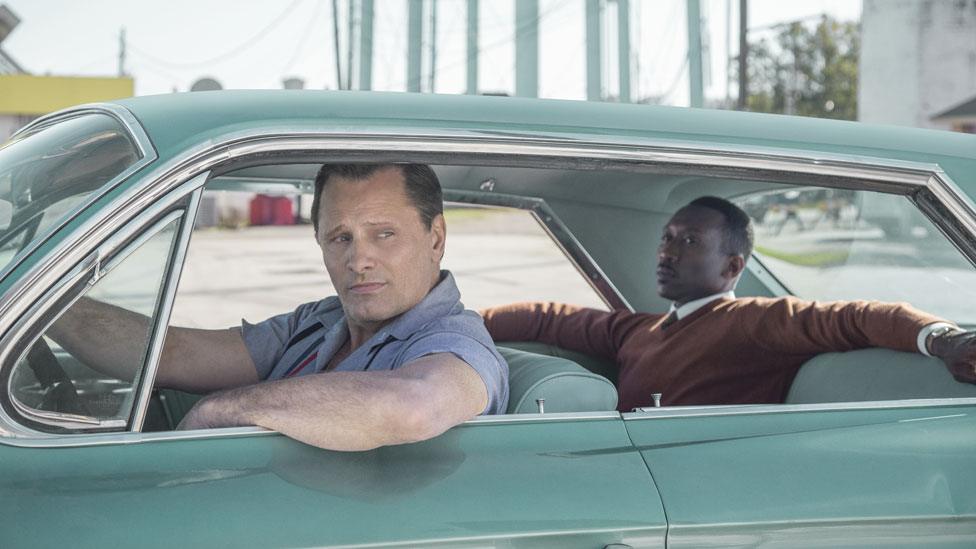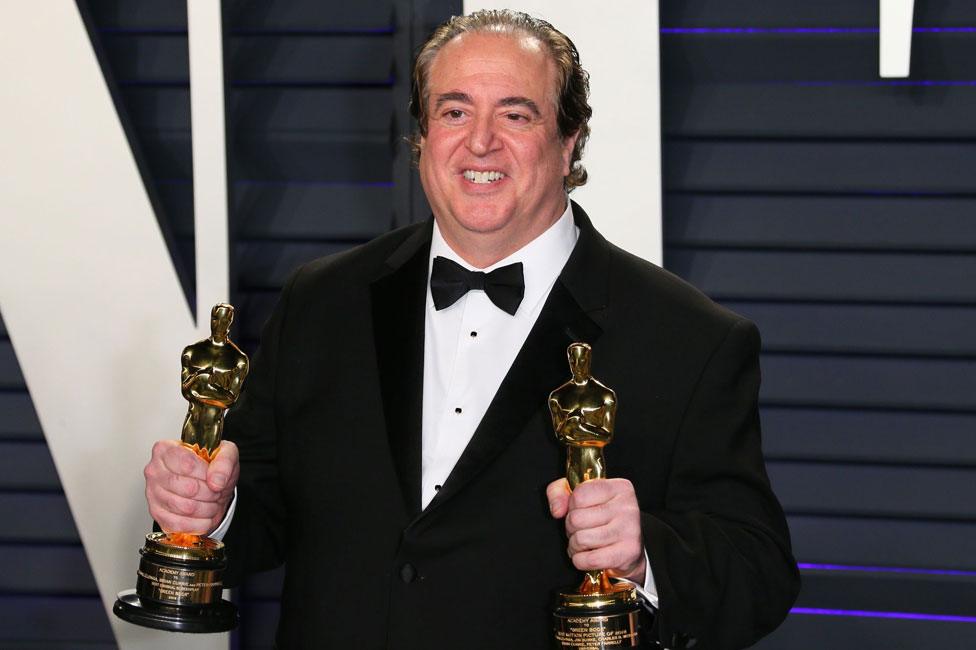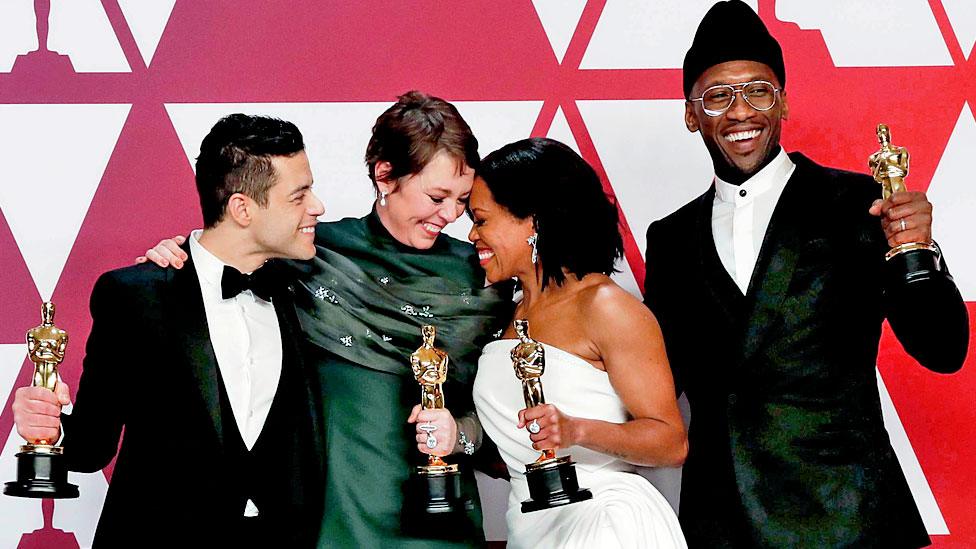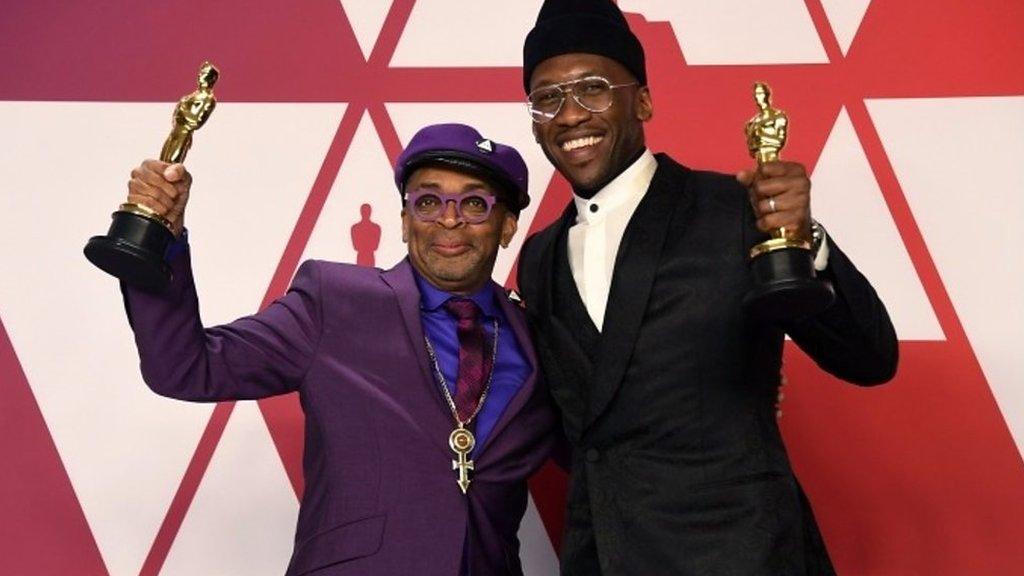Oscars 2019: Green Book best picture win proves divisive
- Published
Spike Lee on why Green Book, which stars Mahershala Ali, was "not my cup of tea"
Spike Lee did not do much to hide his displeasure when Green Book beat his film and six others to this year's best picture Oscar.
According to one report, external, the BlacKkKlansman director tried to storm out of the Dolby Theatre when the winner was read out by Julia Roberts.
"I thought I was courtside at the [Madison Square] Garden and the ref made a bad call," Lee later told reporters, saying the film was "not his cup of tea".
"I'm snake-bit," he joked, using a euphemism for experiencing failure or bad luck. "Every time somebody's driving somebody, I lose."
His comment was a reference to Driving Miss Daisy, winner of the best picture Oscar in 1990 and a film to which Green Book has been compared. Lee's film Do the Right Thing was nominated for two Oscars in 1990 - best original screenplay and best supporting actor - but missed out on both.
In Green Book, an African-American classical pianist is driven around the American south of the 1960s by an Italian-American chauffeur. In Driving Miss Daisy, an elderly Southern matron grudgingly agrees to be chauffeured by an African-American driver.
"They changed the seating arrangement!" said Lee of Green Book, which also won Oscars for its screenplay and for supporting actor Mahershala Ali.
Black Panther star Chadwick Boseman also expressed disappointment as Green Book director Peter Farrelly and his predominantly white production team took to the stage.
Allow X content?
This article contains content provided by X. We ask for your permission before anything is loaded, as they may be using cookies and other technologies. You may want to read X’s cookie policy, external and privacy policy, external before accepting. To view this content choose ‘accept and continue’.
On Twitter, meanwhile, Green Book's victory over Black Panther, Roma, A Star Is Born and The Favourite generated an immediate backlash.
Allow X content?
This article contains content provided by X. We ask for your permission before anything is loaded, as they may be using cookies and other technologies. You may want to read X’s cookie policy, external and privacy policy, external before accepting. To view this content choose ‘accept and continue’.

Allow X content?
This article contains content provided by X. We ask for your permission before anything is loaded, as they may be using cookies and other technologies. You may want to read X’s cookie policy, external and privacy policy, external before accepting. To view this content choose ‘accept and continue’.

Allow X content?
This article contains content provided by X. We ask for your permission before anything is loaded, as they may be using cookies and other technologies. You may want to read X’s cookie policy, external and privacy policy, external before accepting. To view this content choose ‘accept and continue’.

Justin Chang from the Los Angeles Times was particularly scathing of Green Book's triumph, calling it "the worst best picture Oscar winner since Crash, external." Crash, a multi-stranded drama about race relations in contemporary Los Angeles, was the widely reviled winner of the best picture award in 2006.
"Green Book is about as traditional a choice as you can get," wrote The Independent's Clarisse Loughrey, describing its win as "a case of the same old, same old, external".
The film, which was released in the UK earlier this month, takes its title from a guidebook African-American travellers once used to negotiate the United States.

Viggo Mortensen and Mahershala Ali as Tony Vallelonga and Don Shirley
So what is it about Farrelly's film that has rubbed so many the wrong way? For many, it's the idea that the film perpetuates the "white saviour" trope that can be found in so many Hollywood films about bigotry and intolerance.
Ali's character, real-life musician Don Shirley, is pivotal to the story. Yet its real protagonist is Viggo Mortensen's Tony "The Lip" Vallelonga, a bouncer-cum-bodyguard whose friendship with Shirley makes him wise up to his own racial prejudices.
According to Vox's critic Todd VanDerWerff, external, the film "lets white folks off the hook for whatever responsibility we bear for the crushing weight of systemic racism". The film has also been criticised for its use of a so-called "magical negro" figure, external whose sole function is to facilitate positive change in a white character.
Green Book won the People's Choice award at last year's Toronto Film Festival - an award seen by many as a reliable indicator of Oscar glory. Yet the film would soon run into a number of public relations potholes that made last night's win seem like a remote possibility.
First came Mortensen's use of 'the N-word' in a post-screening Q&A session, an incident for which he issued a fulsome apology, external. Then came criticism from members of Shirley's family, who dismissed the film as "a symphony of lies, external" that exaggerated Vallelonga's relationship with his employer.

Nick Vallelonga with two of Green Book's Oscars
In January, Farrelly issued his own apology for exposing his penis to colleagues in the late 1990s, saying he had been "an idiot" and that he was now "deeply sorry".
More contrition followed from Vallelonga's son Nick, one of Green Book's writers, over a 2015 tweet in which he claimed he had seen Muslims in New Jersey celebrating the 9/11 attacks.
Controversy dogged Green Book all the way to the Oscar ceremony itself, with some questioning whether it was right to have veteran congressman John Lewis present its best picture citation, external. The US author and journalist Raquel Cepeda, external wrote that President Donald Trump "would have been a better peddler of Green Book's saccharine propaganda".
Yet it would be wrong to say the film is entirely without friends. "I don't care about what they say, Green Book is a such a fantastic movie and deserved that freaking Oscar!" tweeted, external one defiant fan on Monday.

Follow us on Facebook, external, on Twitter @BBCNewsEnts, external, or on Instagram at bbcnewsents, external. If you have a story suggestion email entertainment.news@bbc.co.uk, external.
- Published25 February 2019

- Published25 February 2019
